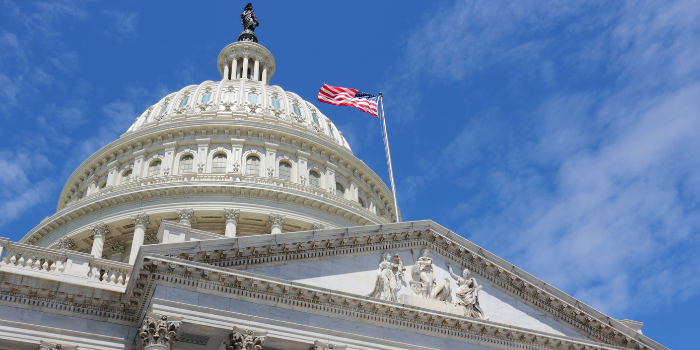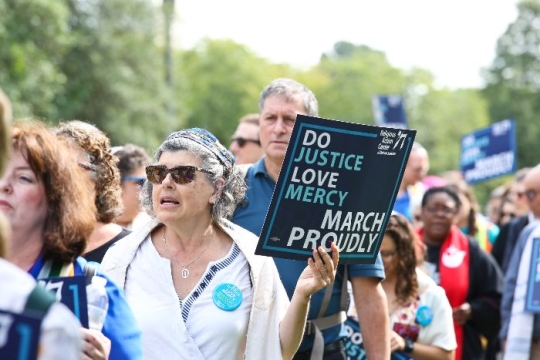
Congress’s last week in session in 2019 was dramatic, tense, and consequential for millions of people in America and around the world. Although the headlines on December 18 and the days following focused on the House of Representatives’ vote to impeach President Trump, Congress succeeded in averting a government shutdown and passed a military spending bill, which the president signed on December 20.
In the fiscal year 2020 appropriations bills, which fund the federal government through September 30, 2020 (the remainder of the federal fiscal year) and the 2020 National Defense Authorization Act (NDAA), Congress included a number of social justice policies that the RAC and members of the Reform Movement have long worked on – with some successes and some disappointments. Here’s a round-up of some of the outcomes you may have missed in the end-of-year frenzy on Capitol Hill:
Funding for Gun Violence Research: For the first time in more than 20 years, Congress included funding in the 2020 spending bill for the Centers for Disease Control and Prevention (CDC) and the National Institutes of Health (NIH) to study gun violence. The agencies will split the $25 million included in the bill. This is a huge victory, and we will continue to push for increased annual funding to support this critical research.
Full-Year Funding for the 2020 Census: Congress also ensured that the U.S. Census Bureau will have robust, full-year funding for the 2020 Census. A fair, accurate census is critical for determining political representation, federal funding, and much more. With the official count kicking off on April 1, this funding will be necessary to help ensure everyone in America is counted. Learn more about how you can help Get Out the Count.
Passage of Federal Paid Leave: In a provision unrelated to military spending, Congress included 12 weeks of paid parental leave for federal workers in the NDAA. This is a significant step forward for 2.1 million federal workers as we continue to work toward the passage of the FAMILY Act to provide paid family and medical leave for all workers in America.
Inclusion of the Fair Chance Act: Language from the bipartisan Fair Chance Act requiring hiring managers in the federal government and federal contractors to wait until the job application process is further along before inquiring about past criminal convictions was also included in the NDAA. This policy, known as “ban the box,” is one way to help even the playing field in the job market for returning citizens. In May 2019, nearly 700 Reform Jews urged their members of Congress to support the Fair Chance Act during the RAC’s 2019 Consultation on Conscience.
Repeal of the Transportation Benefits Tax: Critical to Reform congregations and institutions, Congress passed a repeal of the transportation benefits tax. Originally included in the 2017 Tax Cuts and Jobs Act, this provision required nonprofits to pay a new unrelated business income tax (UBIT) on employer-provided transportation benefits. This meant our congregations, camps, and religious schools were forced to pay taxes simply because they provide parking spots for clergy and staff outside their buildings, diverting financial resources, creating administrative burdens, and unnecessarily taxing a benefit that is critical to the mission of nonprofits. We welcome this repeal.
Funding for Immigration Detention and Deportation: Congress failed to rein in spending for Immigration and Customs Enforcement (ICE) and Customs and Border Protection (CBP) in the Department of Homeland Security (DHS) funding bill. Congress did not cut funding for these agencies, included funding for a wall at our southern border, and is permitting DHS to continue to transfer funding internally, allowing the agency to increase funds for ICE and CBP even beyond the spending levels allocated by Congress. We welcome the addition of provisions to increase oversight and transparency, but believe additional mechanisms are necessary to hold these agencies accountable.
Reauthorization of the D.C. school voucher program: We were disappointed to see Congress include a reauthorization of the D.C. school voucher program through 2023. As the only federally-funded school voucher program in the country, the D.C. Opportunity Scholarship Program diverts $20 million of taxpayer money to private schools in the District of Columbia each year and has been shown to negatively impact student’s achievement. Approximately two-thirds of these private schools are religious, causing indirect government funding of religion and threatening the First Amendment’s guarantee of religious liberty.
Continuation of the ban on transgender people serving openly in the military: In the NDAA, Congress failed to repeal the Trump administration’s policy that bans transgender soldiers from transitioning and requires recruits to serve in the role of their sex assigned at birth. In an earlier version of the NDAA, the House overturned the ban with bipartisan support, but the provision was dropped in the final version of the bill. Several lawsuits challenging the ban are making their way through the federal courts, and legislation has been introduced in the House and Senate to protect transgender servicemembers in the Armed Forces.
From critical funding for gun violence research to increased opportunities for formerly incarcerated people and more, we’re proud of these end-of-year achievements. At the same time, we recognize the disappoints and the enormous amount of work that lies ahead. We look forward to continuing this critical advocacy – with your help – in 2020.
Related Posts

Announcing the Launch of the Reform Movement's 2021 Racial Justice Campaign: What You Need to Know

Celebrating Transgender Day of Visibility: Why the Senate Must Pass the Equality Act


